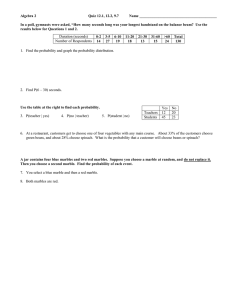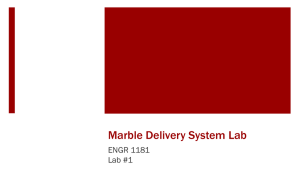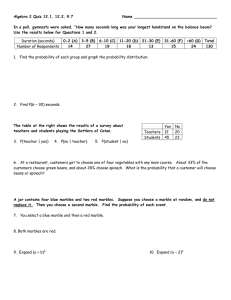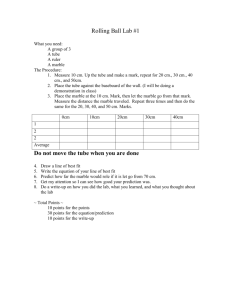Please Note:
advertisement
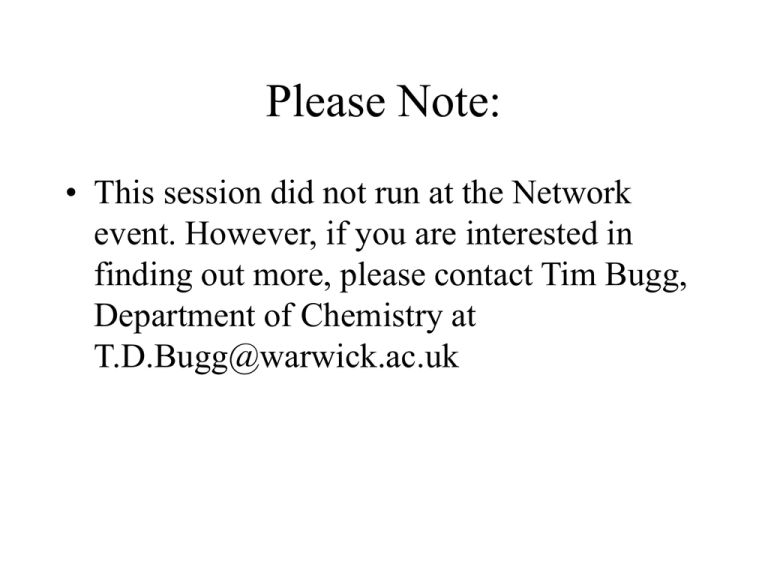
Please Note: • This session did not run at the Network event. However, if you are interested in finding out more, please contact Tim Bugg, Department of Chemistry at T.D.Bugg@warwick.ac.uk Team Development Days for Undergraduate Students Professor Tim Bugg Department of Chemistry History 1994 Team Development in Chemistry at Southampton University Led by Dr. Mike Rawlins (BP) 1995-2000 BP-sponsored team development programme at Several UK Universities 2000 Started team development at Warwick Chemistry NOW 12 staff trained as tutors in Chemistry Run half-day programmes for ALL Year 1 & Year 2 UG’s Run 2-day programme for ALL Year 1 PhD students Why do Team Development for Undergraduate Students? •Get to know people in tutorial/learning groups •A lot of group work in undergraduate degree: •Tutorials •Practicals •Group projects •Most companies work in teams, important skill for career •A transferable skill, can apply in many non-University situations What do we do? 1. Welcome to large group, aims for session 2. Divide into groups of 6-8, orientation, ground rules 3. Exercise (30 min) 4. Review of exercise, facilitated by tutor (initial feelings, what team did well/could have done better) 5. Key learning points from day Orientation •Form a group of 6-8 people, write names on flip-chart •Form a circle,say someone else’s name & throw ball to that person •Continue until you are familiar with names •In pairs, take 2 minutes to interview partner, find out: •Name, where from in University •An interest outside the University •A quality that they bring to the group •Then report back to the group Exercise: Marble Run Your task is to transfer a “marble” from the start line to the finish cup Your team has been given a number of pieces of track. You must conform to the following rules: •Once started, the marble must not stop rolling •Nothing and nobody must come into contact with the marble apart from the track •Only one piece of track can be in contact with the marble at any one time •Each team member must be involved at least once in the transfer process i.e. they must be holding at least one piece of track along which the marble travels •When transferring the marble, the person holding that piece of track must have both feet stationary •The marble may not be thrown or transferred in any other way than along the track •The finish cup cannot be moved Your team has 15 minutes to plan a solution to the task, and will then have two attempts to complete the task in front of the other team, and the tutor, who will adjudicate. Review •Each person summarise (in a few words) their feelings at the end of the exercise •What things did the team do well? •What things could the team have done better, in retrospect? •If individuals in the group were not happy, why not? How could it have gone better from their point of view? •The 2 groups will then meet to present their conclusions about the exercise, and any learning points that emerged! Discussion Could this be useful for your students? Any questions? Would you be interested in: •observing a Chemistry event? •being trained as a tutor? Emotional Learning Curve NOW Intellectual Route Impart knowledge Accept LATER Apply Understand Do Emotional Route Risks Frustration Disappointment Anger Hurt pride Embarrassment Feel Rewards Awareness Morale Pride Confidence Control Kolb’s Learning Cycle Experience Plan Review Conclude
